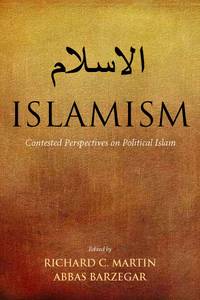
Stanford University Press has just published Islamism: Contested Perspectives on Political Islam, edited by Richard C. Martin and Abbas Barzegar. In this book Political Scientist Donald Emmerson argues for an inclusive use of the term “Islamism” in order to rescue the term from its misappropriation in the media. This is followed by my essay, in which I argue that the term “Islamism” is as tainted as “Mohammedanism” and should be avoided as a replacement for fundamentalist and political Islam. Our two essays are followed by twelve short responses from a variety of perspectives, Muslim and non-Muslim. The contributors include Feisal Abdul Rauf, Syed Farid Alatas, Hillel Fradkin, Graham Fuller, Hasan Hanafi, Amir Hussain, Ziba Mir-Hosseini and Richard Tapper, M. Zuhdi Jasser, Bruce Lawrence, Anouar Majid, Angel Rebasa and Nadia Yassine. Given the range of perspectives on one of the hot topics of the day, this volume will be a great addition to courses on Islam or the Middle East.
The publisher’s description is presented below:
As America struggles to understand Islam and Muslims on the world stage, one concept in particular dominates public discourse: Islamism. References to Islamism and Islamists abound in the media, in think tanks, and in the general study of Islam, but opinions vary on the differences of degree and kind among those labeled Islamists. This book debates what exactly is said when we use this contentious term in discussing Muslim religion, tradition, and social conflict.
Two lead essays offer differing viewpoints: Donald K. Emmerson argues that Islamism is a useful term for a range of Muslim reform movements—very few of which advocate violence—while Daniel M. Varisco counters that the public specter of violence and terrorism by Islamists too often infects the public perceptions of Islam more generally. Twelve commentaries, written by Muslim and non-Muslim intellectuals, enrich the debate with differing insights and perspectives.